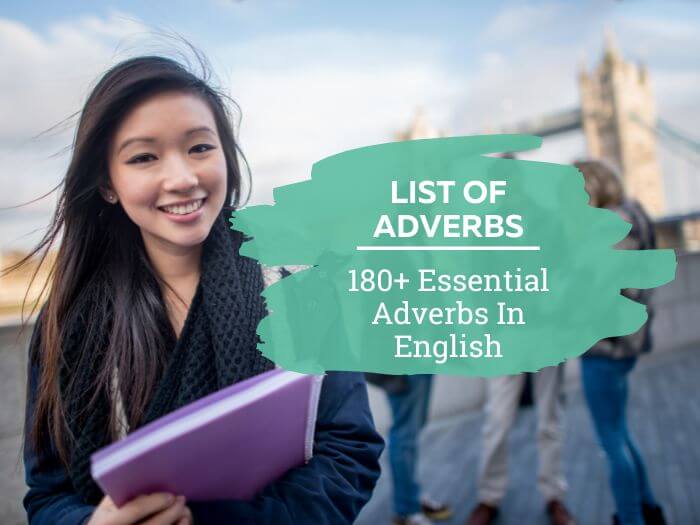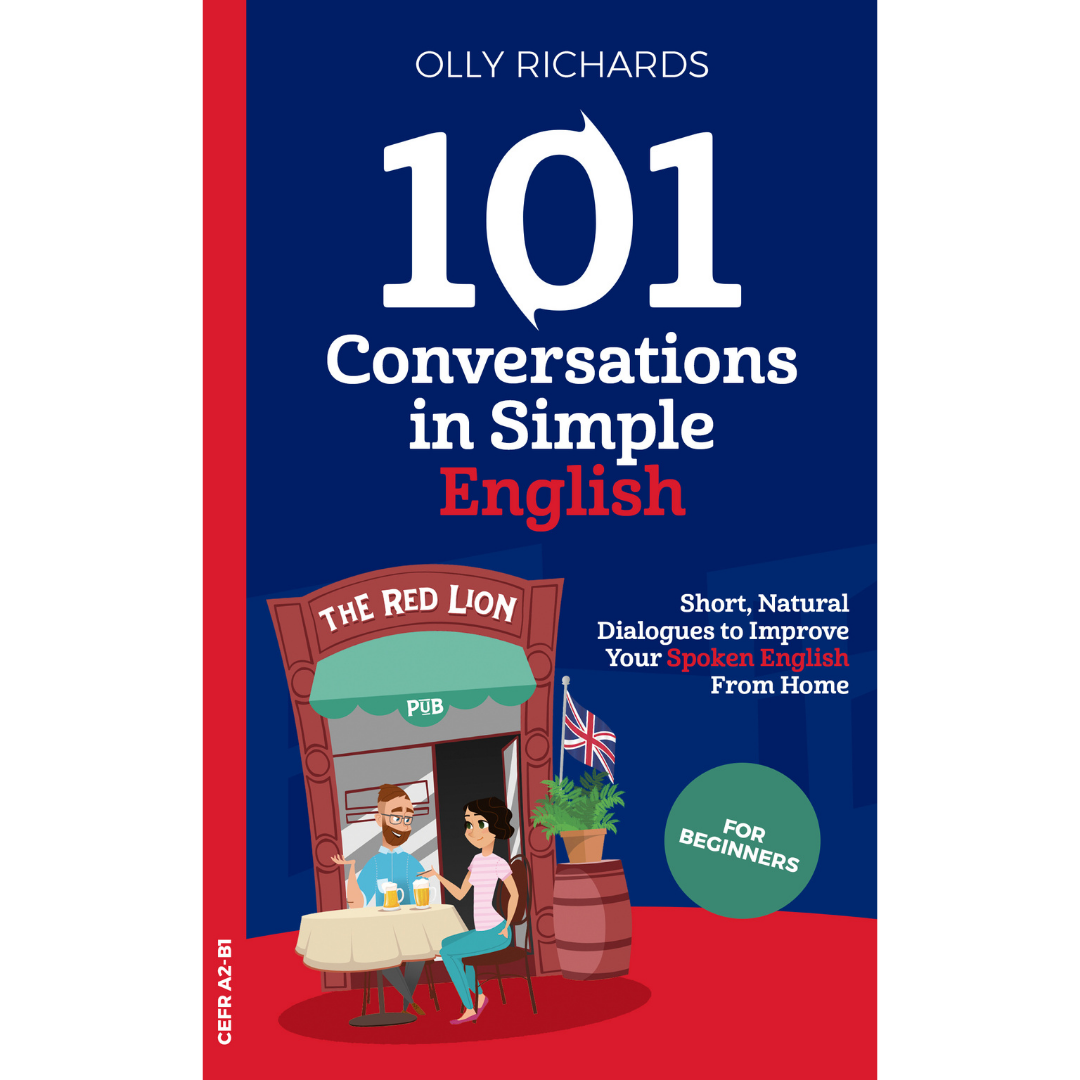Adverbs. The Oxford Dictionary tells us that this term comes from adverbium, a Latin word composed of ad- (to – expressing addition) + verbum (word, verb).
That’s exactly what adverbs do: they add more information about other words (verbs, adjectives, or other adverbs) or groups of words (sentences).
There are several types of adverbs in English and they’re all so very common (I’ve already used one – exactly – in the sentences above!)
In this list of adverbs, you'll discover 10 different types:
Table of Contents
As this is a list of adverbs with examples, I’ll also show you how I used some of these adverbs in easy English stories I wrote for you.
Okay, I’m ready. Are you?
Let’s go!
1. Adverbs Of Manner (How?)
You can speak English in many different ways: well, quickly, fluently, etc. “Well,” “quickly,” and “fluently” are adverbs of manner because they explain how you perform an action. These adverbs are usually formed by adding –ly to adjectives. Like this:
- quick – quickly
- slow – slowly
- bad – badly
Some are irregular though.
- good – well
- fast – fast
- good – well
- hard – hard
- late – late
- straight – straight
- high – high
Here are some examples of adverbs of manner.
- Carefully
- Slowly
- Quickly
- Quietly
- Badly
- Happily
- Easily
- Loudly
- Confidently
- Gently
- Neatly
- Cheerfully
- Bravely
- Accurately
- Gracefully
- Clearly
- Beautifully
- Correctly
- Honestly
Position in the sentence
Normally they come after the verb…
- Example: They went quickly into the room.
…or after the object:
- He jumped into the pool quietly.

Some more examples:
- I can use grammar accurately.
- The dancer moved gracefully across the stage.
- The instructions were written clearly at the top of the page.
2. Adverbs Of Place (Where?)
Adverbs of place tell us where something happens. These adverbs can show us location, direction, distance, or position. Let's look at some examples in this adverbs of place list:
- Here
- There
- Everywhere
- Somewhere
- Nowhere
- Outside
- Inside
- Above
- Below
- Near
- Far
- Around
- Up
- Down
- Away
- Abroad
- Back
- Forward
- Ahead
- Underneath
- Nearby
Position in the sentence
They usually come after the main verb or the object. They might come at the end or beginning of a sentence.
Examples:
The children ran outside while their parents watched.
Inside, they saw a big table.

3. List Of Adverbs Of Time (When?)
Adverbs of time tell us when something happens.
Let's look at some examples in this adverbs of time list:
- Now
- Then
- Today
- Yesterday
- Tomorrow
- Tonight
- Soon
- Later
- Early
- Late
- Already
- Immediately
- Finally
- Recently
- Initially
- Eventually
- Soon
- Still
- Yet
- Nowadays
- Before
Position in the sentence
They usually go in the end or front position, but they can also come in the middle of a sentence.
Here are 3 examples:
- I’ve never been there before.
- Tomorrow I’m going to the cinema.
- I’ll soon go to India.

4. List Of Adverbs Of Frequency (How Often?)
Adverbs of frequency describe how often something happens.
Examples:
- Always
- Often
- Sometimes
- Rarely
- Never
- Usually
- Frequently
- Occasionally
- Regularly
- Every day
- Weekly
- Monthly
- Annually
- Constantly
- Seldom
- Once
- Twice
- Daily
- Repeatedly
Position in the sentence
These may come at the beginning of a sentence, in the middle, or at the end.
Examples:
- I go there sometimes.
- They frequently visit their grandparents on weekends.
- Occasionally, my friends come to my place for dinner.

5. List Of Adverbs Of Degree (To What Extent?)
These adverbs indicate the level or intensity of an action, adjective, or another adverb.
You can see some examples in this adverbs of degree list:
- Very
- Quite
- Almost
- Too
- Enough
- Just
- Nearly
- Hardly
- Barely
- Extremely
- Fairly
- Rather
- Absolutely
- Completely
- Deeply
- Highly
- Intensely
- Utterly
- Somewhat
- Sufficiently
- Totally
Position in the sentence
These may come at the beginning of a sentence, in the middle, or at the end.
Examples:
- I like pizza a lot!
- She’s really intelligent.
- You haven’t studied enough.
Let’s pause for a moment to read this passage from a book I’ve written for you – Short Stories in English for Beginners: Read for pleasure at your level, expand your vocabulary and learn English the fun way!
What types of adverbs can you find in the story? (Hint: I found 7 in total)
Valior looked Aldin carefully again. Were his words influencing Aldin’s opinions? Aldin’s face showed nothing. ‘Do you get it now?’ he continued. ‘We can use Maha to get what we want. The Kalkian Emperor is in our hands. And all because his stupid little girl felt ignored!’ Valior let out a big laugh. It was a laugh that made Aldin’s heart feel cold. Aldin looked at the Emperor. Here was a man who Aldin had always trusted. A man who was so important to Aldin. But now all Aldin felt was disgust. Valior was using a child to get what he wanted. And he would not let it happen. Aldin smiled and said, ‘I understand very clearly now, Emperor. As you wish.’
Now check your answers.
Valior looked Aldin carefully again. Were his words influencing Aldin’s opinions? Aldin’s face showed nothing. ‘Do you get it now?’ he continued. ‘We can use Maha to get what we want. The Kalkian Emperor is in our hands. And all because his stupid little girl felt ignored!’ Valior let out a big laugh. It was a laugh that made Aldin’s heart feel cold. Aldin looked at the Emperor. Here was a man who Aldin had always trusted. A man who was so important to Aldin. But now all Aldin felt was disgust. Valior was using a child to get what he wanted. And he would not let it happen. Aldin smiled and said, ‘I understand very clearly now, Emperor. As you wish.’
- Carefully: adverb of manner
- Again: adverb of time
- Always: adverb of frequency
- So: adverb of degree
- Now: adverb of time
- Very: adverb of degree
- Clearly: adverb of manner
6. Adverbs Of Purpose (Why?)
Adverbs of purpose explain the reason for an action or event. They tell us why something is done or why something happens.
Examples:
- Therefore
- Thus
- Hence
- So
- Consequently
- Because
- Since
- Accordingly
Position in the sentence
These adverbs often come at the beginning of a sentence to introduce the reason, but they can also appear in the middle to connect ideas within a sentence.
Examples:

- She studied hard. Therefore, she passed the exam.
- He didn’t like the film, so he left early.
- They practised every day and consequently won the competition.
7. Focusing Adverbs (Emphasis)
Sometimes we need to emphasise certain aspects of the action, subject, or object. That’s when we need focusing adverbs, little words that help us highlight a specific part of the sentence.
Examples:
- Only
- Just
- Even
- Almost
- Generally
- Mainly
- Specifically
- Particularly
- Exactly
- Especially
- Solely
- Merely
Position in the sentence
Focusing adverbs often appear before the word they are emphasizing but can also come at the beginning of a sentence for emphasis.
Examples:
- She only brought her phone with her.
- They just wanted to say sorry.
- Especially in winter, it can get very cold here.

8. Interrogative Adverbs (Question Words)
I’m sure you’ve used interrogative adverbs many times to ask English questions. Have a look at these examples:
- Why (reason)
- Where (place)
- When (time)
- How (manner)
- How often (frequency)
- How long (duration)
- How far (distance)
- How much (quantity/extent)
Position in the sentence
Interrogative adverbs usually appear at the beginning of a sentence when asking a question.
Examples:
- Why did you leave so early?
- Where are they going for their vacation?
- When will you visit us?
9. Relative Adverbs
Relative adverbs are used to join sentences and introduce relative clauses. You use them when you need to add extra information about a place, time, or reason related to the main clause.
There are 3 relative adverbs in English:
- Where
- When
- Why
Position in the sentence
Relative adverbs generally appear at the beginning of a relative clause, so they’re usually in the middle of a sentence.
Examples:
- This is the park where we first met.
- I remember the day when we went hiking.
- She didn’t explain the reason why she left so suddenly.

Notice how these adverbs can help you replace the more formal structure “in which,” “for which,” “on which,” “at which,” etc.
Examples:
- This is the park where we first met. (This is the park in which we first met.)
- I remember the day when we went hiking. (I remember the day on which we went hiking.)
- She didn’t explain the reason why she left so suddenly. (She didn’t explain the reason for which she left so suddenly.)
10. Conjunctive Adverbs
You use conjunctive adverbs when you need to connect two independent clauses by showing their relationship (e.g., contrast, addition, cause and effect, sequence, etc.)
Examples:
- However (contrast)
- Therefore (cause and effect)
- Moreover (addition)
- Nevertheless (contrast)
- Consequently (result)
- Meanwhile (time/sequence)
- Similarly (comparison)
- Furthermore (addition)
- First (sequence)
- Instead (contrast)
- Thus (cause and effect)
- Hence (cause and effect)
- Otherwise (condition)
Position in the sentence
Conjunctive adverbs can come at the beginning, middle, or end of a sentence.
Examples:

- I wanted to join the meeting. However, I was too busy.
- I cannot come to the party. I need to finish my homework first.
- It’s a challenging task. Nevertheless, we need to complete it.
11. Sentence Adverbs
The final type of adverb in this list of adverbs are sentence adverbs. A sentence adverb is a word that modifies a whole sentence or clause rather than a single word.
These adverbs are also known as sentence adverbial or disjuncts (fancy word!) and we use them when we want to express our attitude or give a perspective on the information that we are going to include in the sentence.
Here are some examples of sentence adverbs:
- Actually
- Apparently
- Basically
- Briefly
- Certainly
- Clearly
- Conceivably
- Confidentially
- Curiously
- Evidently
- Fortunately
- Hopefully
- However
- Ideally
- Incidentally
- Indeed
- Interestingly
- Ironically
- Naturally
- Predictably
- Presumably
- Regrettably
- Seriously
- Strangely
- Surprisingly
- Thankfully
- Theoretically
- Therefore
- Truthfully
- Ultimately
- Wisely
Position in the sentence
Sentence adverbs usually come at the beginning of a sentence or clause, but they may also appear in the middle or at the end.
Examples:
- Honestly, I didn’t expect this result.
- Fortunately, the weather cleared up in time for the event.
- Obviously, they are happy with the decision.
- My friend was late to the meeting, unfortunately.
Let’s see one more passage from another book I’ve written for you – 101 Conversations in Simple English: Short Natural Dialogues to Boost Your Confidence & Improve Your Spoken English.
What types of adverbs can you find? (I’ve found 5 differen types).
Charlie enters the room where Alice and Lawrence are having tea. He sits with them, and Alice begins asking him questions about the day of the robbery.
Alice: Charlie, Mr. Windsor says you are Welsh.
Charlie: Yes, I’m from Cardiff!
Alice: Like my father. Bore da!
Charlie: Great! Bore da.
Alice: Okay, if you don’t mind, let’s talk about the day of the robbery. Did anything strange happen?
Charlie: It was yesterday, right?
Alice: Yes, it was yesterday, Saturday.
Charlie: Everything was normal; nothing out of the ordinary… except one thing.
Alice: What?
Charlie: When I was cleaning downstairs, I heard someone opening the coat wardrobe.
Alice: Why is that strange?
Charlie: Because it was so hot yesterday! Who needs a coat when it’s so hot?
Alice: What time was that?
Charlie: At 10:30 in the morning…
See if you have found the same as me.
Charlie enters the room where Alice and Lawrence are having tea. He sits with them, and Alice begins asking him questions about the day of the robbery.
Alice: Charlie, Mr. Windsor says you are Welsh.
Charlie: Yes, I’m from Cardiff!
Alice: Like my father. Bore da!
Charlie: Great! Bore da.
Alice: Okay, if you don’t mind, let’s talk about the day of the robbery. Did anything strange happen?
Charlie: It was yesterday, right?
Alice: Yes, it was yesterday, Saturday.
Charlie: Everything was normal; nothing out of the ordinary… except one thing.
Alice: What?
Charlie: When I was cleaning downstairs, I heard someone opening the coat wardrobe.
Alice: Why is that strange?
Charlie: Because it was so hot yesterday! Who needs a coat when it’s so hot?
Alice: What time was that?
Charlie: At 10:30 in the morning…
- Where: relative adverb
- Yesterday: adverb of time
- What: interrogative adverb
- Why: interrogative adverb
- So: adverb of degree
FAQs About List Of Adverbs
What is a list of 100 adverbs?
Here's a list of 100 common adverbs:
1. Quickly
2. Slowly
3. Happily
4. Sadly
5. Brightly
6. Quietly
7. Loudly
8. Easily
9. Barely
10. Truly
11. Rarely
12. Commonly
13. Often
14. Always
15. Never
16. Seldom
17. Frequently
18. Boldly
19. Awkwardly
20. Gracefully
21. Angrily
22. Sharply
23. Gently
24. Perfectly
25. Smoothly
26. Constantly
27. Silently
28. Closely
29. Vividly
30. Softly
31. Calmly
32. Neatly
33. Finally
34. Briefly
35. Patiently
36. Honestly
37. Secretly
38. Roughly
39. Clearly
40. Correctly
41. Strongly
42. Weakly
43. Faintly
44. Vaguely
45. Briskly
46. Cheerfully
47. Warmly
48. Excitedly
49. Madly
50. Wonderfully
51. Badly
52. Really
53. Absolutely
54. Simply
55. Completely
56. Fully
57. Safely
58. Truthfully
59. Deeply
60. Richly
61. Randomly
62. Equally
63. Especially
64. Greatly
65. Normally
66. Particularly
67. Possibly
68. Suddenly
69. Usually
70. Yesterday
71. Today
72. Tomorrow
73. Instead
74. Thus
75. Then
76. Soon
77. Still
78. There
79. Here
80. Too
81. Sometimes
82. Everywhere
83. Somewhere
84. Anywhere
85. Nearby
86. Outdoors
87. Indoors
88. Upstairs
89. Downstairs
90. Proudly
91. Bravely
92. Firmly
93. Wisely
94. Silently
95. Hastily
96. Tenderly
97. Reluctantly
98. Calmly
99. Smoothly
100. Plainly
What are 50 examples of adverbs?
Here are 50 commonly used adverbs:
1. Quickly
2. Slowly
3. Happily
4. Sadly
5. Easily
6. Rarely
7. Frequently
8. Awkwardly
9. Neatly
10. Finally
11. Briefly
12. Patiently
13. Secretly
14. Vividly
15. Softly
16. Cheerfully
17. Warmly
18. Excitedly
19. Perfectly
20. Loudly
21. Often
22. Seldom
23. Truly
24. Honestly
25. Deeply
26. Calmly
27. Boldly
28. Bravely
29. Brightly
30. Proudly
31. Randomly
32. Freely
33. Simply
34. Madly
35. Firmly
36. Smoothly
37. Roughly
38. Wisely
39. Vaguely
40. Tenderly
41. Reluctantly
42. Plainly
43. Particularly
44. Fully
45. Constantly
46. Truthfully
47. Richly
48. Especially
49. Greatly
50. Normally
What is the most common adverb?
One of the most common adverbs is “very”, used to intensify adjectives or other adverbs, such as in “very quickly” or “very important.”
What are the 10 examples of adverbs?
Here are 10 examples of adverbs in everyday usage:
1. Quickly
2. Slowly
3. Very
4. Often
5. Never
6. Rarely
7. Easily
8. Sometimes
9. Quietly
10. Boldly
How To Learn This List Of Adverbs In English
Thanks for reading another one of my English guides.
As you may have noticed, there are many types of adverbs, so you may be wondering how you can learn and memorise them all.
The good news is that you don’t need to. If you want to learn them, I suggest that you see them in a context where they’re used correctly.
The StoryLearning approach to learning English can help you do that because you’ll see adverbs over and over again in the context of an engaging story – like you did in this post.
You’ll pick up these words naturally as you read books for English learners, which will in turn help you use them with confidence in speaking and writing.
Let short stories in English help you learn!

Olly Richards
Creator of the StoryLearning® Method
Olly Richards is a renowned polyglot and language learning expert with over 15 years of experience teaching millions through his innovative StoryLearning® method. He is the creator of StoryLearning, one of the world's largest language learning blogs with 500,000+ monthly readers.
Olly has authored 30+ language learning books and courses, including the bestselling "Short Stories" series published by Teach Yourself.
When not developing new teaching methods, Richards practices what he preaches—he speaks 8 languages fluently and continues learning new ones through his own methodology.












































